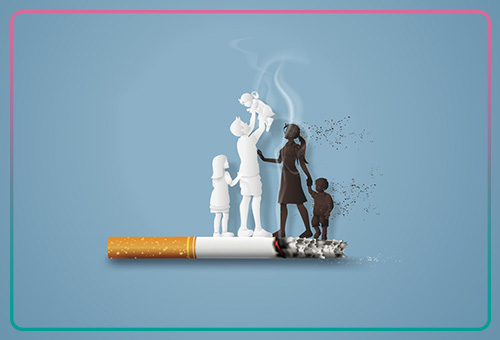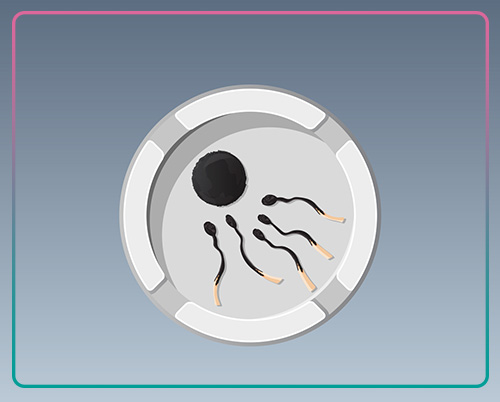Effect of smoking on fertility
Does smoking affect fertility?
Smoking and hookah do not necessarily lead to infertility, but they do have a detrimental effect on couples’ fertility. Smoking can interfere with the functioning of the male and female reproductive system and cause dysfunction in female ovulation and male erections. In addition, smoking and hookah increase the risk of complications and problems during pregnancy.
Most people know that smoking and Tobacco consumption increase the risk of cardiovascular disease, lung disease, and cancer. But many of them are unaware of the negative effects of smoking on fertility problems in men and women.
.How does smoking affect a couple’s fertility?
The rate of infertility in men and women smokers is about twice more than the non-smokers. In addition, with the increase in the number of cigarettes used by men or women during the day, the risk of fertility problems increases.
The effects of smoking and smoking abuse on women’s fertility are as high as those reported in men. Therefore, in order to have a healthy pregnancy, smoking should be stopped in both men and women.
The effect of smoking on male fertility
Chemical and toxic substances in cigarettes and hookahs can reduce sperm quality and function in men. So, in men who regularly smoke and smoke hookahs, the Sperm have not able to enter the egg due to poor quality and poor shape. On the other hand, smoking and hookah may cause genetic abnormalities in sperm and eventually lead to birth defects in the fetus. Learn more about tips to increase fertility for men: Ways to boost sperm quality and increase fertility in men
In addition, smoking can cause impotence in men and lead to erectile dysfunction.
However, there is no reliable scientific evidence that smoking leads to infertility. But research has shown that the number of abnormal sperm in male smokers is higher. In addition, the low sperm counts and low motility in male smokers reduce sperm’s ability to fertilize eggs. Therefore, it is recommended that if a couple intends to become pregnant, it is best to stop smoking before attempting to do so. Learn more about sperm problems and their effect on male fertility: Sperm Problems in Male Infertility
The effect of smoking on women’s fertility:
Smoking in women, in addition, to reducing the quality of eggs, can also have a negative effect on the functioning of the female reproductive system and may cause female infertility.
- Effect of cigarettes on eggs: Smoking destroys the genetic material in the eggs. Therefore, women who smoke are more likely to become pregnant with chromosomal problems in the fetus, miscarriage, or birth defects.
- Effects of smoking on the ovaries: Tobacco use can cause ovarian dysfunction. Smoking in women can cause hormonal changes and menstrual irregularities, making it difficult to ovulate.
- Effects of smoking on the uterus: Smoking can increase the risk of uterine disease and thus adversely affect uterine function. Some research has shown that smoking in women is associated with cervical cancer, which eliminates the chance of fertility in women.
- Effects of smoking on pregnancy: Ectopic pregnancy and preterm delivery are more common among women who smoke. To increase the chance of IVF success, specialists recommend that you stop smoking at least 3 months before the IVF treatment. Learn more about the causes of IVF failure: Causes of IVF failure
- Premature menopause: The presence of chemicals such as nicotine, cyanide, and carbon monoxide in cigarette smoke increases the rate of egg loss. This means that menopause in women who smoke is 1 to 4 years earlier than the non-smokers.
Learn more about ways to improve your egg quality: How To Improve Egg Quality.
Are infertility treatments effective in smokers?
In addition to the negative effects of smoking on male and female fertility, it also reduces the chances of infertility treatment success. Research shows that women who smoke need more medication during the IVF process to stimulate ovulation. However, they have fewer eggs at the time of ovulation. learn more about ways to increase the chances of IVF success: Tips to Increase Your Chances of IVF Success
Also, the rate of pregnancy in smokers women is less common than the non-smokers who choose IVF for infertility treatment.
I (woman) do not smoke, but my wife (man) is a smoker. Does cigarette smoke affect my fertility?
Women who are exposed to cigarette smoke may also be exposed to all the dangers that are mentioned to be. Therefore, smoking cessation is recommended for both men and women to have a healthy pregnancy.
If I stop smoking, will my chances of a healthy pregnancy increase?
Yes, smoking cessation can improve the fertility rate.
However, the reduced egg storage and damaged eggs cannot be compensated. If a person leaves smoking and no longer smokes, complications of pregnancy due to smoking are also reduced.
Stopinging smoking can have numerous health benefits for both the mother and the baby, including reducing the risk of premature birth, low birth weight, and birth defects.
How long after stopping smoking we can try for pregnancy?
The effects of smoking (Types of tobacco products) on fertility can vary depending on the duration and intensity of smoking. It is generally recommended that women and men who are trying to conceive and also fertility treatment stop smoking as soon as possible.
Smoking can have a negative impact on a woman’s fertility by negative effects on the ovaries’ function and reducing the number and quality of the eggs, and can also make it harder to get pregnant by decreasing the chances of pregnancy and increasing the risk of miscarriage.
In general, it is recommended that women wait at least 3-6 months after quitting smoking before trying to conceive. This will give the body time to recover from the effects of smoking and improve the chances of a healthy pregnancy.
It’s also important to note that smoking can also have negative effects on sperm and men’s fertility, such as lower sperm count and quality. Quitting smoking 2-3 months before trying to have a baby by men, can improve sperm quality quantity.
Recourse: The website of the American Fertility Medicine Association and Patient Education.














